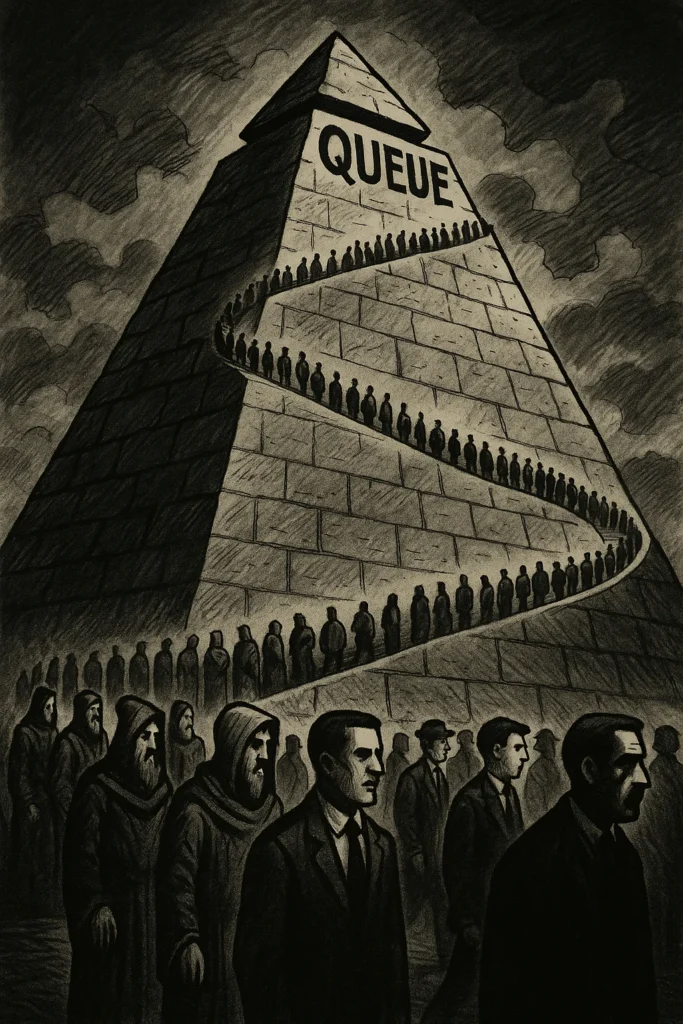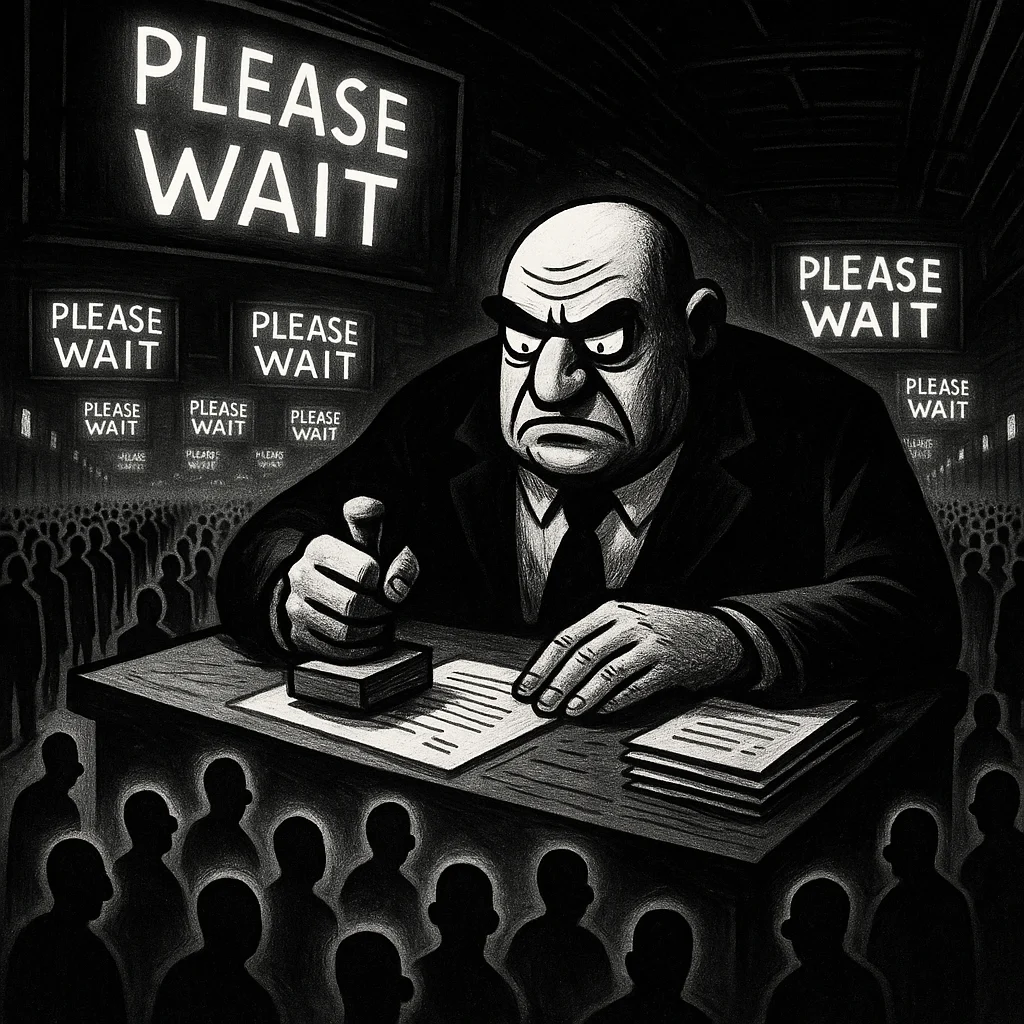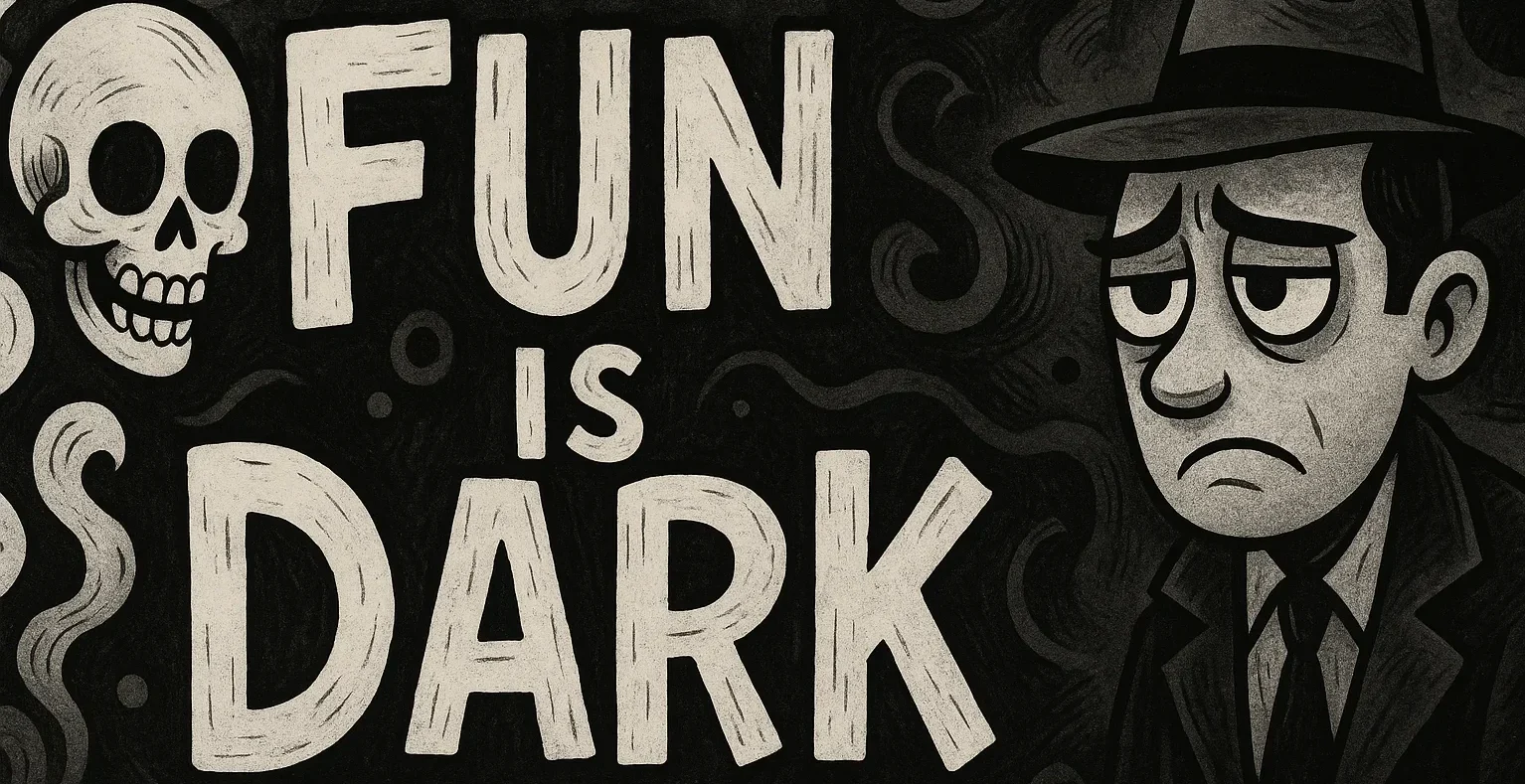(The Eternal Queued: Discover the satirical truth behind the eternal queue conspiracy – how standing in line secretly built civilization, powered religion, fueled capitalism, and now rules the digital age. 6600+ words of absurd, ironic SEO satire.)

📜 Introduction: The Queue Conspiracy (≈600 words)
When we talk about “civilization,” we usually mean fire, agriculture, writing, or the wheel. But none of those inventions explain why humans spend most of their lives standing still, shuffling forward, sighing at the stranger ahead, staring at glowing signs that say “Please Wait.”
The real invention — the one that defines humanity more than any pyramid or algorithm — is the queue.
The queue is the silent dictator of human existence. It shapes how we worship, how we eat, how we work, how we play, and even how we die. Queues are disguised as progress, but in reality, they are civilization’s cage.
No animal lines up to suffer in patience except humans. Even ants move with purpose. Sheep follow flocks, not rope barriers. But humans? We invented velvet ropes, ticket systems, “take a number” machines. We invented boredom. We industrialized waiting.
This is not a simple sociological quirk. This is a global conspiracy of order and absurdity. The eternal queue conspiracy argues that humanity itself is just an endless line. Our “progress” is only the illusion of shuffling forward.
We laughed at Orwell for predicting surveillance. We sneered at Huxley for predicting distraction. But no one warned us of the most banal dystopia: standing in line forever.
This article will prove, satirically and SEO-optimally, that queues are not just part of society. They are society.
🏛️ Part I: Ancient Queues – Civilization Begins With Waiting (≈1500 words)
🌾 Mesopotamia – The First Waiting List
Civilization’s “cradle” was not a nursery. It was a waiting room. The clay tablets of Sumer are filled with lists of names, grain rations, and debts. Scholars claim these are the first examples of writing. But writing was not about poetry. It was about managing lines.
The first bureaucrat wasn’t a poet. He was a queue manager. Tokens were distributed to peasants waiting for barley. The grooves in temple floors weren’t decorative. They were queue lanes designed to keep barefoot peasants in order.
The Tower of Babel? A queue that never ended. People stood in line for bricks, muttering, complaining, mishearing, until no one spoke the same language anymore.
🐪 Egypt – Pyramids as Queue Funnels
The Great Pyramid’s tunnels are too narrow for royal processions. But they are perfect for queues. Pharaohs were not divine kings. They were queue supervisors, standing at the sacred “end of the line.”
Even the afterlife was just another line. Souls queued before Osiris, waiting for their hearts to be weighed. Eternity itself was DMV with crocodile-headed clerks.
🏺 Greece – Democracy as Organized Queue
The Agora, birthplace of democracy, was essentially a glorified ticket system. Citizens lined up to drop pebbles into urns. Philosophers lectured not for enlightenment but for queue entertainment.
Zeno’s paradox? A metaphor for being stuck in line: no matter how fast you move, the person ahead always remains ahead.
The Olympics? Sprinting queues. Athletes lined up, waited for a signal, then moved in synchronized lines across dusty tracks.
🏛️ Rome – Empire of Endless Lines
The Colosseum wasn’t about gladiator fights. It was about 50,000 citizens queuing in and out of arches. Roman law codified waiting times by class: citizens waited less, slaves waited more. Justice wasn’t blind. It was delayed.
The Forum was the ancient queue hub. Every stone is worn down by centuries of shuffling sandals.
Rome didn’t fall because of barbarians. It fell because the line for bread was too long.
🏰 Part II: Medieval Queues – Faith, Feudalism, and Eternal Waiting (≈1500 words)
✝️ Pilgrimage = Queue on Foot
Pilgrimages were not about spiritual journeys. They were about lining up across Europe. The Canterbury Tales? Entertainment for people standing in a medieval super-line stretching from France to England.
Cathedrals weren’t designed for worship. They were queue containers with stained-glass distractions.
🍞 Bread Lines Without Bread
Medieval famines created endless bread lines. People starved, but what they really perfected was patience. The feudal system itself was just a giant vertical queue: peasants at the bottom, nobles cutting ahead.
⚔️ Crusades – Holy Lines to Nowhere
Crusaders marched in “holy processions.” In reality, the Crusades were the world’s longest queue: generations of knights waiting to enter Jerusalem, only to be told, “Please hold.”
📖 Monks and Queue Philosophy
Monasteries invented new forms of waiting: silence, fasting, obedience. Monks copied manuscripts in long halls — not for knowledge, but to kill time while waiting for the apocalypse.
⚙️ Part III: The Industrial Revolution – The Queue Goes Global (≈1500 words)
🏭 Factories = Queue Factories
The assembly line is celebrated as efficiency. But what is an assembly line if not a mechanized queue? Workers waited at their stations, products shuffled past, and industrialists perfected the art of standing still.
Shift changes were just queues disguised as whistles.
🚂 Railroads = Mobile Queues
Railroads didn’t free travel. They just created queues on wheels. Ticket lines, boarding lines, seating lines — trains were the industrial queue experience, stretched across continents.
🏦 Queue Capitalism
Capitalism thrives on waiting. Paychecks arrive every two weeks. Loans demand 30 years of repayment. Retirement is the final queue: work for decades, wait for freedom, then die in line.
Karl Marx wrote about class struggle, but his real insight should have been: all history is queue struggle.
💻 Part IV: The Digital Queue – Algorithms of Waiting (≈1200 words)
🖥️ Loading Bars = Modern Patience Rituals
Every spinning wheel, every progress bar, every buffering circle is a digital queue. We are told it’s temporary. But waiting has become permanent.
🤖 Captchas = Queue Hazing
“Click all the traffic lights.” “Select all images with bicycles.” Captchas are not security. They are ritualized waiting, designed to remind humans that they are supplicants in the digital line.
📱 Social Media = Infinite Queues
Facebook feeds, Twitter timelines, TikTok loops — endless queues of content, scrollable but never arriving anywhere. We don’t consume information. We stand in line for it.
⛓️ Blockchain = Queuechain
Cryptocurrency promised liberation from banks. Instead, it gave us blockchain, literally a chain of queued blocks. Miners are medieval peasants, waiting for rewards that never come.
🌐 Part V: Political Queues and the Future of Waiting (≈1300 words)
🗳️ Democracy = State Queue Management
Voting is not empowerment. It’s queuing with paperwork. Citizens line up for ballots, line up for results, then line up again four years later.
⚖️ Bureaucracy = Queues Weaponized
Need healthcare? Queue. Need justice? Queue. Need to prove you exist? Take a number. Bureaucracy is the art of turning human lives into numbered tickets.
🚀 Future Queues – The Metaverse of Waiting
By 2050, the metaverse won’t be entertainment. It will be queue simulation. Avatars lining up for digital goods. Paid subscriptions to skip virtual lines. Artificial Queue Intelligence (AQI) whispering: Your existence is very important to us. Please hold.
✅ Conclusion: The Queue Is Humanity (≈600 words)
History is not the story of invention, kings, or revolutions. It is the story of waiting.
We are born waiting, we live in lines, we die waiting for answers that never arrive.
The eternal queue conspiracy is not absurd. It is obvious. Civilization is a waiting room with pyramids for walls, factories for benches, and smartphones for number tickets.
We laugh at the absurdity of queues. But that laughter is just queue entertainment.
The only real question is: what are we waiting for?
🌾 Mesopotamia – The First Waiting Room
When schoolbooks describe Mesopotamia as “the cradle of civilization,” they fail to mention that it was also the cradle of standing in line. The rivers Tigris and Euphrates nourished the soil, but they also created bottlenecks. Irrigation canals required waiting your turn. Priests rationed grain, and peasants queued up for their daily handful.
Clay tablets, once thought to contain the world’s first laws, are full of lists. Long, boring lists. Lists of names, lists of sheep, lists of grain sacks. Scholars call it “bureaucracy.” A more honest translation is: queue management system.
In the temple of Ur, archeologists uncovered a massive hall with parallel grooves carved into the floor. The official explanation: “ritual pathways.” The real explanation: queue lanes. Imagine a Sumerian peasant, sweaty and barefoot, clutching a clay token and waiting three hours for a priest to stamp it with approval. Congratulations, you’ve invented civilization.
The myth of the Tower of Babel? It wasn’t about language. It was about waiting. Thousands of workers, standing in line for bricks, misheard one another’s complaints until nobody understood anybody anymore. The punishment wasn’t confusion. It was being stuck in line forever.
🐪 Egypt – The Pyramids as Queue Machines
Egypt’s monuments are even more blatant. The Great Pyramid is described as a tomb. Yet every internal chamber narrows into long, claustrophobic passageways. Why? Because they are funnels for queues.
Hieroglyphs depict priests, peasants, and slaves in neat lines. Egyptologists call these processions. The hamster conspiracy — sorry, the queue conspiracy — calls them what they are: ancient queue diagrams.
Pharaohs weren’t gods. They were queue supervisors. Their divine duty was not to command armies but to stand at the end of the line, glowing with divine patience, while everyone else shuffled forward. Death itself became a queue: the Book of the Dead is essentially an instruction manual on how to wait politely before Osiris.
Even the afterlife, according to Egyptian myth, required standing in line. Souls waited to have their hearts weighed against a feather. Imagine eternity as the DMV, but with more crocodile-headed demons.
The Nile itself? Seasonal floods forced entire villages into holding patterns. Farmers waited, season after season, for the waters to recede. Egypt was not the gift of the Nile. It was the gift of waiting.
🏺 Greece – Democracy as a Line
The Greeks loved to brag about democracy, philosophy, and the Olympics. But beneath every marble column, you’ll find a queue.
Democracy = Queue-ocracy
Citizens lined up in the Agora to vote by dropping pebbles into jars. This was not free expression. It was the world’s first government-issued queue. Socrates himself was executed not because of philosophy, but because he cut the line.
The Greek word demos means people. Kratia means power. But a more honest translation of democracy is: people standing in line forever.
Philosophy as Queue Entertainment
Philosophers like Plato and Aristotle gathered students in long colonnades. To the untrained eye, these were schools. To the initiated, they were waiting rooms with lectures. Philosophy kept citizens busy while they stood in line for bread, water, or political judgment.
Even Zeno’s paradox — the one about Achilles never overtaking a tortoise — is just a metaphor for standing in line. No matter how fast you move, you’re always waiting for the person in front of you.
The Olympics: Lines in Motion
The Olympics are remembered for running, wrestling, and discus. But what is a footrace if not a queue moving really fast? Athletes lined up, waited for a signal, then moved in formation. Winners weren’t celebrated for strength or speed, but for enduring the longest queue under the hottest sun.
🏛️ Rome – Empire of Endless Lines
Rome perfected the queue. Roads, aqueducts, forums, and circuses weren’t about expansion. They were about queue management on an imperial scale.
🏛️ The Colosseum: Queue Theater
Gladiators fought to entertain, yes, but the real spectacle was outside: queues of 50,000 people snaking through arches, waiting for bread and blood. Romans queued for tickets, for food, for water fountains. Emperors controlled crowds not with armies but with queue distribution. “Bread and circuses” was code for “queues and more queues.”
Roman Law: Codified Waiting
Roman law is praised for structure and clarity. But read between the lines: it’s about who gets to wait and how long. Citizens waited less, slaves waited more. Justice was not blind. It was delayed.
The Latin phrase habeas corpus means “you shall have the body.” In practice, it meant “wait in line until a magistrate gets bored enough to notice you.”
The Forum: Queue Central
The Roman Forum was the beating heart of the empire. Temples, courts, markets, and government offices were arranged not for efficiency but for maximum queuing capacity. Archaeologists note that the paving stones are unusually grooved. Why? Because thousands of sandals shuffled in the same place, day after day, century after century.

🌍 Beyond Rome – Queues as Universal Culture
From China’s Great Wall (a queue of soldiers stretched across mountains) to India’s caste system (a queue of souls waiting for reincarnation upgrades), every society developed its own version of the eternal line.
In Mesoamerica, Mayan pyramids doubled as stair-step queues to the heavens. In Africa, tribal councils gathered not in circles but in slow-moving lines. In the Pacific islands, fishing expeditions became waiting lists for the ocean.
No culture escaped. No empire resisted. Wherever humans gathered, queues followed.
Conclusion: The Queue as Origin
The story of ancient civilization is the story of standing in line. From Sumerian grain halls to Roman amphitheaters, queues defined social order, justice, and faith.
We remember these societies for their art, law, and architecture. But what truly unites them is not philosophy or empire. It is the eternal shuffle forward, the sigh, the glance at the person ahead, the resigned acceptance that life is waiting.
History does not begin with fire. It begins with a line

